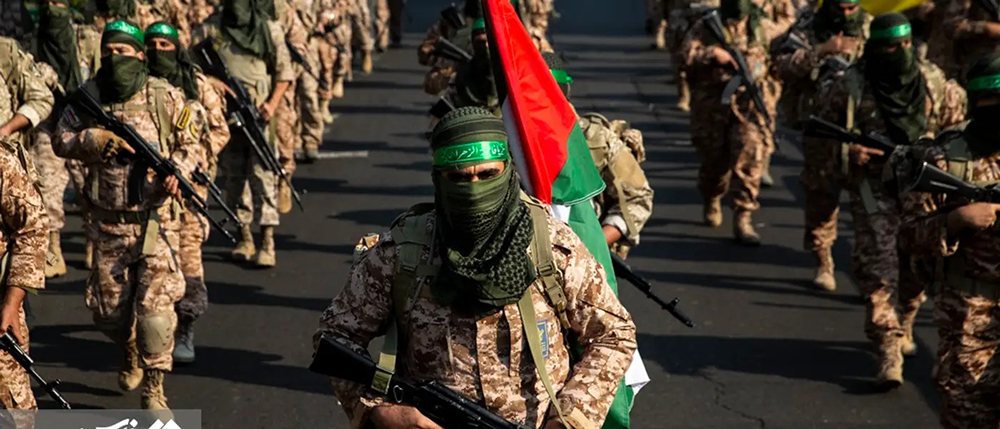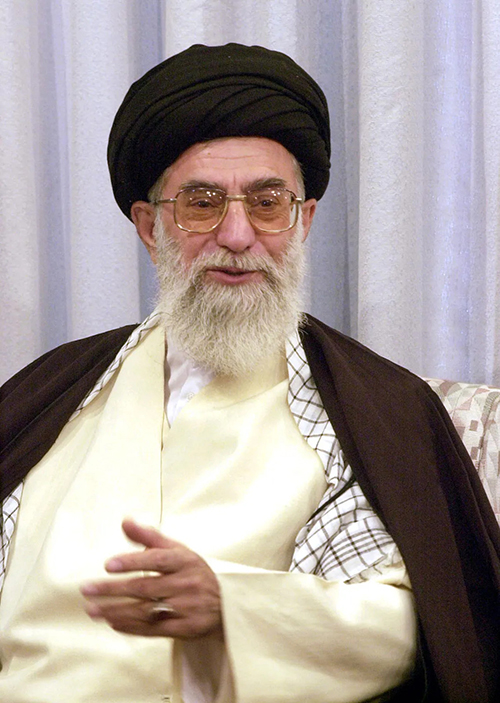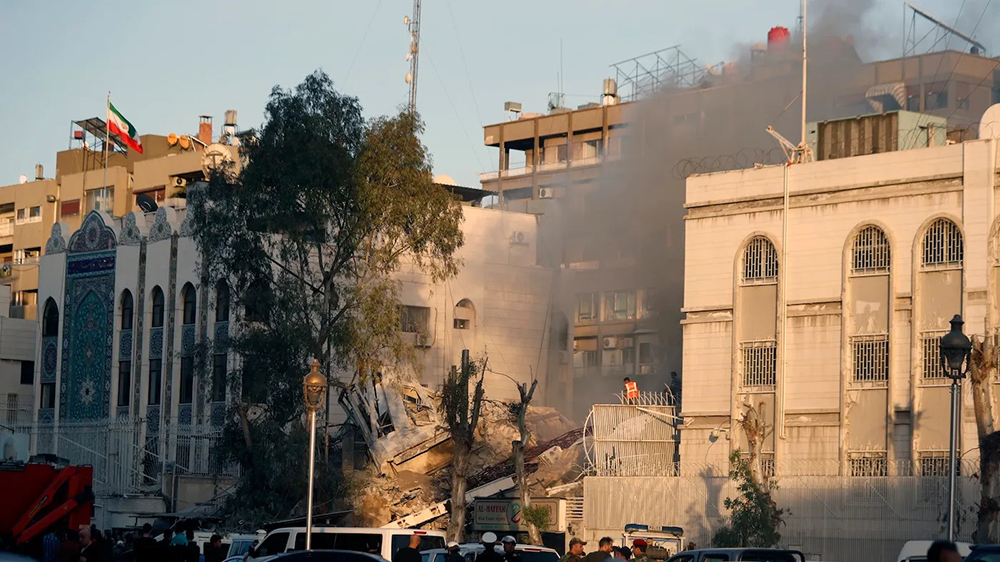|
Getting your Trinity Audio player ready...
|
Edited by: TJVNews.com
In a region already fraught with tensions, Israel’s recent airstrikes on an Iranian embassy compound in Syria have sparked fears of further escalation and retaliatory strikes. According to a report published on Tuesday in the New York Times, current and former U.S. officials have expressed apprehension over the potential consequences of the attack, which resulted in the deaths of three generals from Iran’s Quds Force and four other officers.
The Quds Force, an external military and intelligence service of the Islamic Revolutionary Guards Corps (IRGC), plays a pivotal role in Iran’s regional operations and support for proxy militias, as was noted in the NYT report. The strike dealt a significant blow to this influential force, raising concerns about potential repercussions.
Syrian Foreign Minister Faisal Mekdad, alongside Syria’s interior minister, expressed strong condemnation of what he termed an “atrocious terrorist attack,” the NYT report said. The scene at the site was one of shock and grief as the aftermath of the strike became apparent.
According to Iran’s ambassador to Syria, the strike specifically targeted a consular building within the embassy compound, as was reported in the NYT, Additionally, he noted that his residence, located on the top two floors of the building, was also affected by the attack.

The gravity of the situation was further underscored by the IRGC which confirmed the loss of seven Iranian military advisers in the strike. According to the NYT report, among the casualties was Brigadier General Mohammad Reza Zahedi, a senior commander within the Quds Force.
With Iran being a key player in the ongoing conflicts in the Middle East, any attack on its diplomatic missions is viewed as a serious escalation that could further destabilize an already volatile region.
The targeting of diplomatic premises, which are supposed to be protected under international law, has drawn condemnation from various quarters. As detailed in the NYT, the loss of civilian lives and the destruction of diplomatic property represent egregious violations of established norms and principles governing state conduct.
Ralph Goff, a former senior C.I.A. official with extensive experience in the Middle East, condemned Israel’s actions as “incredibly reckless,” according to the report in the NYT. He warned that the attack could fuel escalation by Iran and its proxies, posing a serious threat to American troops stationed in the region. Goff’s assessment underscores the gravity of the situation and the potential risks involved in escalating tensions.
Indeed, in the aftermath of the Israeli strike, reports emerged of heightened activity in the region. American troops based in southeastern Syria reportedly intercepted an attack drone, signaling a potential threat to U.S. forces, as was explained in the NYT report. While it remains unclear if the drone was targeting American troops specifically, the incident underscores the volatile nature of the situation.
A Defense Department official, speaking on the condition of anonymity, highlighted the significance of the drone interception and the need for vigilance. The incident, if confirmed as an attempted attack by Iran-backed militias, would mark the first such assault against American troops in Iraq or Syria in nearly two months, the NYT report affirmed.

Despite no further attacks reported overnight, Pentagon officials remain on high alert, closely monitoring developments in the region. The situation remains fluid, with the potential for further escalations looming large.
Iran’s Islamic Revolutionary Guard Corps (IRGC) and its Quds Force unit have long been targets of Israel’s efforts to degrade Iran’s military capabilities and disrupt its activities, particularly those aimed at harming Israeli interests worldwide, the NYT report indicated. The recent deadly strike in Syria, orchestrated by Israel, is seen as part of this broader strategy to counter Iran’s influence and curb its aggression.
According to Mr. Goff, Israel’s actions are consistent with its objective of weakening the IRGC and the Quds Force, while also deterring them from pursuing hostile actions against Israeli citizens globally, as per the information in the NYT report. This targeted approach reflects Israel’s commitment to safeguarding its security and preventing Iran from extending its reach closer to Israel’s borders.
In the ongoing shadow war between Iran and Israel, Syria has emerged as a critical battleground. Israel has consistently targeted Iranian military assets and infrastructure in Syria, aiming to disrupt Iran’s efforts to transfer advanced weaponry and support to its proxies, such as Hezbollah, operating near Israel’s northern border.
Dana Stroul, formerly a top Pentagon official focused on Middle East policy and now affiliated with the Washington Institute for Near East Policy, told the NYT that the recent strike in Syria carries significant risks. The NYT report pointed out that she drew parallels to the U.S. drone strike that killed Qassim Suleimani, the former leader of the Quds Force, in 2020, suggesting that both actions have the potential to escalate tensions and trigger broader conflict in the region.
Stroul emphasized the importance of assessing the aftermath of Suleimani’s death, noting that while it degraded the command and control of the Quds Force, it also led to a more decentralized but equally lethal network of Iran-backed militia groups. Despite changes in leadership and dynamics within the Quds Force, Iran’s overarching strategy of supporting terrorist networks abroad remains unchanged, the report in the NYT affirmed. Tehran continues to prioritize its interests and investments in proxy warfare to advance its regional agenda and deter threats to its regime.
Stroul asserted to the NYT that the message behind the strike is clear: operatives and leaders of the Islamic Revolutionary Guards Corps (IRGC) are not safe anywhere. She emphasizes that the strike should serve as a deterrent, undermining the perceived invincibility and deniability of the Quds Force, which has been linked to destabilizing activities and violence across the region.
Also speaking to the NYT was Kenneth F. McKenzie Jr., a retired four-star general with extensive experience in the Middle East. He acknowledged the significant impact of the strike on the Quds Force. He also highlighted the loss of long-term relationships and strategic assets, indicating that the strike will disrupt the Quds Force’s operational capabilities and influence in the region.
However, Stroul warns that the strike could provoke further escalation from Tehran. The question remains whether Iran will choose to de-escalate the situation or retaliate in a manner that escalates tensions further, as was described by the NYT. The potential for a cycle of retaliation and counter-retaliation raises concerns about the possibility of broader conflict in the region.
In response to fears of escalation, Sabrina Singh, a Pentagon spokeswoman, emphasized to the NYT that the United States had no involvement in the airstrike and was not informed about it in advance. She underscored the importance of conveying this message directly to Iran through private channels in order to prevent misunderstandings and mitigate the risk of further escalation.

The strike, which targeted a section of the Iranian Embassy complex in Damascus, stands as one of the deadliest incidents in the ongoing conflict between Israel and Iran, underscoring the high stakes and escalating tensions between the two adversaries.
Ayatollah Ali Khamenei, Iran’s supreme leader, issued a stern statement vowing that Israel would face retribution at the hands of Iran’s “brave men,” as was reported in the NYT. This declaration highlights Iran’s determination to respond forcefully to what it perceives as a flagrant violation of international law.
President Ebrahim Raisi of Iran denounced the airstrike as an “inhumane assault” and emphasized that it would not go unanswered. However, the NYT report also said that he refrained from providing specific details regarding Iran’s intended response to the Israeli aggression.
Iran’s Foreign Minister, Hossein Amir Abdollahian, took to social media to announce that Iran had summoned the Swiss ambassador to convey a crucial message to Washington. Asserting that the United States must be held accountable for Israel’s actions as its ally, Abdollahian underscored Iran’s expectation of a response from the U.S. Switzerland, acting as an intermediary between Iran and the United States due to the absence of diplomatic relations between Tehran and Washington, played a pivotal role in facilitating this communication, according to the information provided in the NYT report.
Seyyed Nezamoldin Mousavi, the spokesman for the leadership of Iran’s Parliament, echoed the sentiment of retaliation, describing it as a “national request” by the Iranian people, the report in the NYT claimed. This reflects the widespread public outrage in Iran over the Israeli airstrikes and the demand for decisive action from the Iranian government in response to the attack.
In Washington, the National Security Council spokeswoman, Adrienne Watson, emphasized that the United States had no prior knowledge of the strike and played no role in its execution, as was mentioned in the NYT report. This statement was communicated directly to Iran, indicating the U.S.’s intent to distance itself from the incident.
Meanwhile, in cities across Iran, including Tehran, Tabriz, and Isfahan, large crowds have taken to the streets, brandishing Palestinian and Iranian flags while chanting anti-Israel and anti-American slogans. As per the information contained in the NYT report, the fervent calls for vengeance reflect the deep-seated animosity towards Israel and the United States within segments of Iranian society.
The timing of the airstrikes, coinciding with significant holidays in Iran, has added fuel to the fire. As Iranians observe religious and national celebrations, the mood has been overshadowed by a sense of outrage and defiance in response to the Israeli aggression. The NYT report also suggested that despite attempts by government authorities to maintain order, dissenting voices have persisted, with some gathering in parks to continue their festivities despite the presence of security forces.
Amidst the escalating tensions, the United Nations Security Council has convened an emergency meeting to address Israel’s attack. The NYT report said that Russia, a staunch ally of Iran, spearheaded the request for the meeting, underscoring the international significance of the situation.
In a letter to the UN, Iran’s ambassador expressed condemnation of the airstrikes, denouncing them as violations of international law and a threat to regional peace and stability. However, the report also indicated that the exact course of action Iran will take in response to the strikes remains uncertain. The options range from direct military retaliation against Israel, risking further escalation, to continued support for terrorist proxies in the region as part of its broader strategy.
For Israeli Prime Minister Benjamin Netanyahu, the successful elimination of these Iranian commanders represents a significant political victory amidst mounting pressure and calls for his resignation, the NYT report said. The timing of the strike, amidst ongoing conflict with Hamas and the Israeli hostages in Gaza, underscores the strategic importance of the operation.
Israel’s ability to penetrate Iranian intelligence networks demonstrates its determination to disrupt and deter Iran’s regional proxies. This approach aims to undermine Iran’s influence and capabilities in the region, even as conflicts in Gaza persist.
According to Ali Vaez, Iran project director for the International Crisis Group, Israel’s targeting of key Iranian officials signals a shift in strategy beyond merely intercepting advanced weapons shipments, as was explained in the NYT report. However, Vaez also notes that while eliminating experienced generals may temporarily weaken Iran’s capabilities, the Iranian system remains resilient, with replacements readily available.
Netanyahu’s emphasis on Iran as Israel’s main adversary suggests that the strike could bolster his image as a leader committed to national security. However, the NYT reported that some experts, such as Sanam Vakil of Chatham House cautioned that while the attack may enhance Netanyahu’s reputation domestically, it may not be sufficient to address the broader challenges posed by ongoing conflicts and Iran’s enduring influence in the region.
Israel’s strike on Iranian commanders represents a calculated move to assert its interests and security in the face of regional threats. However, the potential risks of escalation and retaliation underscore the complex dynamics at play in the Middle East, where competing interests and alliances continue to shape the geopolitical landscape.




